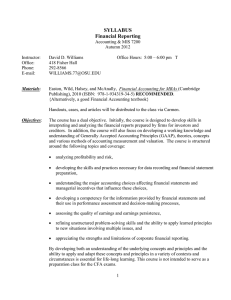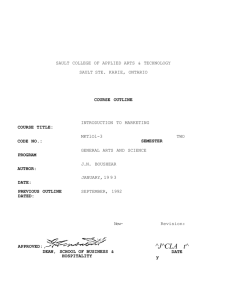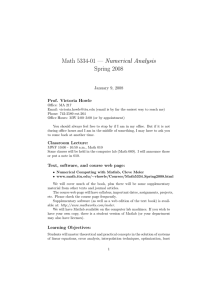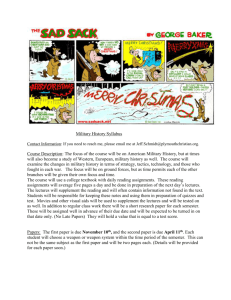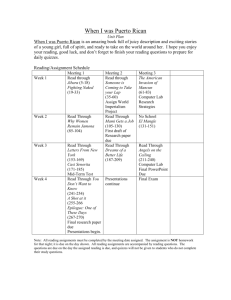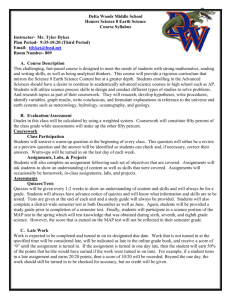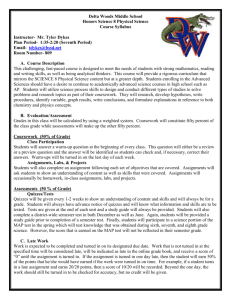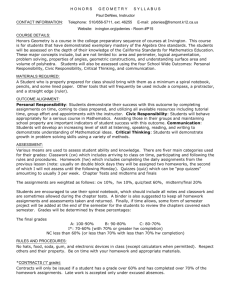420SYL - CSU, Chico
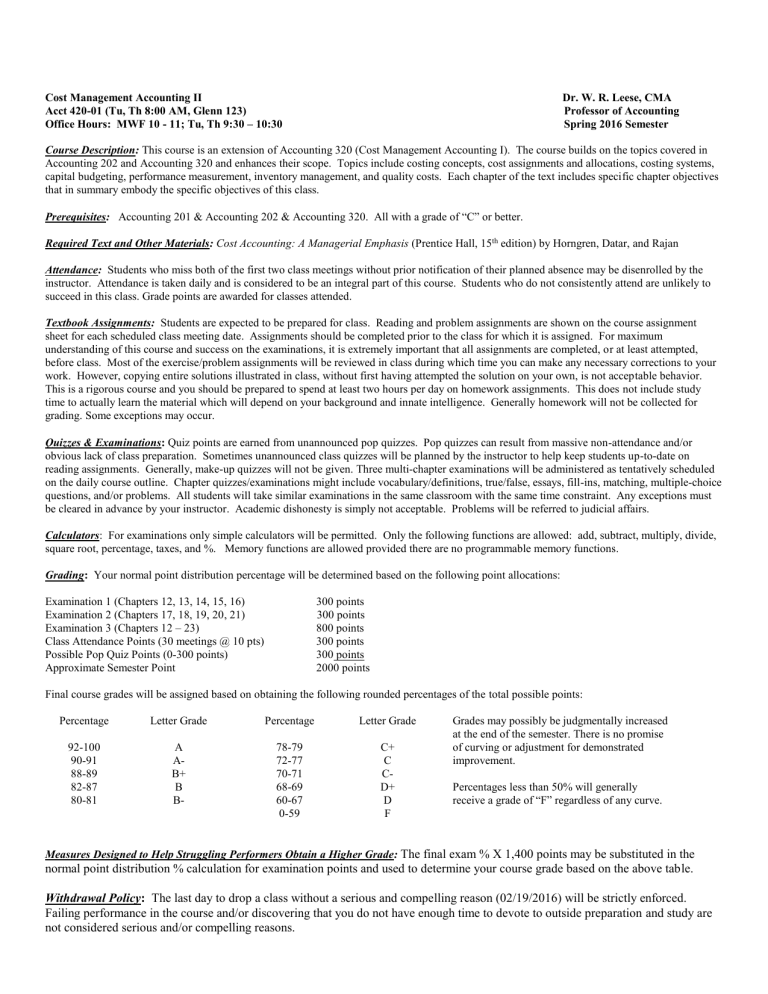
Cost Management Accounting II Dr. W. R. Leese, CMA
Acct 420-01 (Tu, Th 8:00 AM, Glenn 123) Professor of Accounting
Office Hours: MWF 10 - 11; Tu, Th 9:30 – 10:30 Spring 2016 Semester
Course Description: This course is an extension of Accounting 320 (Cost Management Accounting I). The course builds on the topics covered in
Accounting 202 and Accounting 320 and enhances their scope. Topics include costing concepts, cost assignments and allocations, costing systems, capital budgeting, performance measurement, inventory management, and quality costs. Each chapter of the text includes specific chapter objectives that in summary embody the specific objectives of this class.
Prerequisites: Accounting 201 & Accounting 202 & Accounting 320. All with a grade of “C” or better.
Required Text and Other Materials: Cost Accounting: A Managerial Emphasis (Prentice Hall, 15 th edition) by Horngren, Datar, and Rajan
Attendance: Students who miss both of the first two class meetings without prior notification of their planned absence may be disenrolled by the instructor. Attendance is taken daily and is considered to be an integral part of this course. Students who do not consistently attend are unlikely to succeed in this class. Grade points are awarded for classes attended.
Textbook Assignments: Students are expected to be prepared for class. Reading and problem assignments are shown on the course assignment sheet for each scheduled class meeting date. Assignments should be completed prior to the class for which it is assigned. For maximum understanding of this course and success on the examinations, it is extremely important that all assignments are completed, or at least attempted, before class. Most of the exercise/problem assignments will be reviewed in class during which time you can make any necessary corrections to your work. However, copying entire solutions illustrated in class, without first having attempted the solution on your own, is not acceptable behavior.
This is a rigorous course and you should be prepared to spend at least two hours per day on homework assignments. This does not include study time to actually learn the material which will depend on your background and innate intelligence. Generally homework will not be collected for grading. Some exceptions may occur.
Quizzes & Examinations: Quiz points are earned from unannounced pop quizzes. Pop quizzes can result from massive non-attendance and/or obvious lack of class preparation. Sometimes unannounced class quizzes will be planned by the instructor to help keep students up-to-date on reading assignments. Generally, make-up quizzes will not be given. Three multi-chapter examinations will be administered as tentatively scheduled on the daily course outline. Chapter quizzes/examinations might include vocabulary/definitions, true/false, essays, fill-ins, matching, multiple-choice questions, and/or problems. All students will take similar examinations in the same classroom with the same time constraint. Any exceptions must be cleared in advance by your instructor. Academic dishonesty is simply not acceptable. Problems will be referred to judicial affairs.
Calculators : For examinations only simple calculators will be permitted. Only the following functions are allowed: add, subtract, multiply, divide, square root, percentage, taxes, and %. Memory functions are allowed provided there are no programmable memory functions.
Grading: Your normal point distribution percentage will be determined based on the following point allocations:
Examination 1 (Chapters 12, 13, 14, 15, 16)
Examination 2 (Chapters 17, 18, 19, 20, 21)
Examination 3 (Chapters 12 – 23)
Class Attendance Points (30 meetings @ 10 pts)
Possible Pop Quiz Points (0-300 points)
Approximate Semester Point
300 points
300 points
800 points
300 points
300 points
2000 points
Final course grades will be assigned based on obtaining the following rounded percentages of the total possible points:
Percentage Letter Grade Percentage Letter Grade Grades may possibly be judgmentally increased at the end of the semester. There is no promise
92-100
90-91
88-89
82-87
80-81
A
A-
B+
B
B-
78-79
72-77
70-71
68-69
60-67
0-59
C+
C
C-
D+
D
F of curving or adjustment for demonstrated improvement.
Percentages less than 50% will generally receive a grade of “F” regardless of any curve.
Measures Designed to Help Struggling Performers Obtain a Higher Grade: The final exam % X 1,400 points may be substituted in the normal point distribution % calculation for examination points and used to determine your course grade based on the above table.
Withdrawal Policy: The last day to drop a class without a serious and compelling reason (02/19/2016) will be strictly enforced.
Failing performance in the course and/or discovering that you do not have enough time to devote to outside preparation and study are not considered serious and/or compelling reasons.
Americans with Disabilities Act:
If you need course adaptations or accommodations because of a disability or chronic illness, or if you need to make special arrangements in case the building must be evacuated, please see me during my office hours.
Accessibility Resource Center is the designated department responsible for approving and coordinating reasonable accommodations and services for students with disabilities.
www.csuchico.edu/arc .
Multitasking-free Zone: This classroom is a multitasking-free zone. This means that all of your attention is to be focused on the task at hand. Distractions disrupt mental concentration. The following examples of common distractions will not be tolerated and represent unacceptable behavior during our class time together: (1) entering the classroom late or leaving early, (2) walking in and out of the classroom once class has begun, (3) use of cell phones (including voice, text, camera features, data services, or even allowing a cell phone to ring or vibrate loudly), (4) using a lap top computer, e-reader, iPad, or tablet during class, (5) using ear buds, (6) reading or studying materials off task, from inside or outside the scope of ACCT 420, and especially (7) idle chit-chat with neighboring students.
